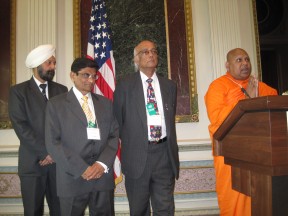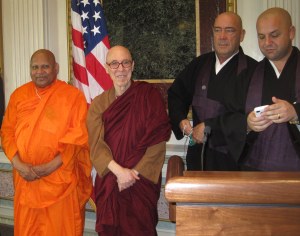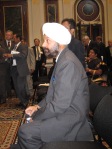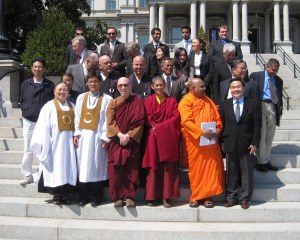Eager
to translate their faith into programs of social justice and
humanitarian service, followers of these Dharmic religions have sought
dialogue with the U.S. government in order to find pathways along which
they can contribute more effectively to their communities, their
nation, and the world.
Ven. Bhikkhu Bodhi
Until recently conferences on interfaith cooperation in the U.S. have
almost always centered on the Abrahamic religions of Judaism,
Christianity, and Islam. Yet over the past forty years America has
become a much more diversified and pluralistic society. The relaxing of
restrictions on immigration, followed by the post-war upheavals in
Southeast Asia in the 1970s, has dramatically transformed our
population. Large numbers of Americans now have religious roots that go
back, not to the deserts of Judea and Arabia, but to the plains,
mountains, and villages of ancient India. For convenience, these are
grouped together under the designation “the Dharmic faiths.” They
include Buddhists, Hindus, Jains, and Sikhs, and their national origins
range from Pakistan to Japan, from Burma to Vietnam, and from Mongolia
to Sri Lanka. Not all are immigrants. At least one whole generation of
people of Asian descent has been born and raised in America, and think
of themselves principally as Americans following a Dharmic religion.
Eager to translate their faith into programs of social justice and
humanitarian service, followers of these Dharmic religions have sought
dialogue with the U.S. government in order to find pathways along which
they can contribute more effectively to their communities, their
nation, and the world.
On April 20, 2012, these efforts were rewarded by a historic conference convened at the White House, Community Building in the 21st Century with Strengthened Dharmic Faith-Based Institutions.
Buddhist Global Relief was honored to be one of the Dharmic faith
organizations invited to attend. Many Hindu, Jain, and Sikh
organizations, as well as other Buddhist organizations, also
participated. I went as the representative of Buddhist Global Relief. I
was delighted to meet a number of old Buddhist friends and to make a few
new ones. Among these was the popular Buddhist blogger Danny Fisher, who had interviewed me a few times by email over the years but whom I had never met in person.
The conference was co-hosted by the White House Office of Faith Based
and Neighborhood Partnerships, the White House Office of Public
Engagement and Intergovernmental Agencies, and Hindu American Seva
Charities (HASC). Also present from the Buddhist community were Bill
Aiken, Director of Public Affairs for Soka Gakkai International, one of
the co-organizers; Ven. Katugastota Uparatana of the Maryland Buddhist
Vihara; Koshin Paley Ellison and Robert Chodo Campbell of the New York
Zen Center for Contemplative Care; and Tricycle journalist Clark Strand.
In his opening remarks, Paul Monteiro, Associate Director of the
White House Office of Public Engagement, observed that the
Dharmic-American community is interested in all the same issues that
everyone is interested in—healthcare, security, education, etc. He
encouraged the participants to follow up this conference with action,
saying “the real measure of this conference’s success will be in how
much more engaged in service the Dharmic communities become in the
months ahead.”
Anju Bhargava of HASC, lead organizer of the event, said: “As we see it, in America, the seva
[service] movement is a tool for social justice, a way to deal with
community issues. The eastern Dharmic traditions share many
commonalities. We are trying to understand how can we engage with each
other collectively, what are our issues? How can more of us engage with
the administration?… We hope this will be the first step in the Dharmic
community coming together to explore and identify common ground and
building a coalition that will strengthen each other and our nation.”
Former U.S. Senator, civil rights champion and presidential adviser
Harris Wofford spoke of the profound contribution that Asian
spirituality made to the Civil Rights movement, recounting that it was a
workshop on Gandhi that had deeply inspired the actions of civil rights
pioneer Rosa Parks on the day she refused to move to the back of the
bus. On a personal level, he said, it was his encounters with Gandhians
in the late 1940’s that inspired his dedication to the Civil Rights
movement.
During a session with Rev. Suzan Johnson Cook, United States
Ambassador-at-Large for International Religious Freedom, concerns were
raised about the condition of religious minorities (Hindu, Sikh,
Buddhist, and others) in Pakistan and Bangladesh, as well as the plight
of Buddhists in Southeast Asia and Tibet. Dr. Siva Subramanian, HASC
Board Member, called on the ambassador to bring the American Dharmic
community to the table so they can work more closely with her in
addressing their concerns.
Other topics discussed were the high suicide rates among Asian
immigrants, the problems being faced by Burmese and Bhutanese refugees
in America, the networking of Dharmic community resources for disaster
response, the support of religious literacy programs in public schools,
and providing support for Dharma-based members of the U.S. Armed Forces.
Bill Aiken of Soka Gakkai summed up the consensus among the Buddhist
delegates with his comment: “I thought this conference marked an
expansion and deepening of the dialogue between the Obama Administration
and the Buddhist, Hindu, and Jain communities, as well as a growing
recognition of the contributions these faiths are making in American
society. I think it got a number of the faith representatives thinking
about how they can expand on and deepen those contributions.”
Parts of this blogpost were drawn from the press release on the
conference issued by Hindu American Seva Charities. For the full press
release, see here.




No comments:
Post a Comment